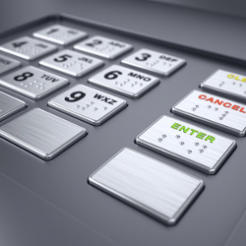The RNIB is offering to provide legal representation to anybody with sight impairments that has problems using the cash machines within the Olympic Park, in a pointed challenge to London 2012 organising committee Locog and Games sponsor Visa.
The charity has been at loggerheads with two organisations since July, when the RNIB discovered that the eight Visa ATM machines within the Olympic Park would not have audio functionality.
The eight machines replaced 27 existing cash machines within the Olympic sites, as part of Visa's exclusive sponsorship of the Games. This means that spectators, competitors and officials cannot use their Mastercard debit or credit cards to withdraw money within the Olympic Park and other venues.
RNIB had been working with Locog for three years to ensure that the Olympics and Paralympics would be fully accessible to blind and partially-sighted people, and was “extremely disappointed” to learn just weeks before the Games opened that the new ATMs would not meet these standards.
Even though the machines feature Braille and tactile keypads and boast a socket for headphones, the software was not installed in time to enable these to work.
On 10 July the charity wrote to Locog requesting that it retrofit the ATMs – which are all branded Raphael’s - to enable audio output and threatened legal action if this was not done.
Soon afterward a letter was received from Visa Europe, the Games sponsor that supplies the ATMs, confirming that two of the eight machines would be adapted to feature speech enablement. Visa also committed to stationing staff by the ATMs to provide assistance to disabled customers. However, Visa insisted that there wasn’t enough time before the start of the Games to adapt the other six machines.
RNIB accepted this was true and in late July withdrew its threat of legal action. However, it has not given up the fight entirely. Steve Winyard, its head of policy and campaigns, said today: “Should a person with sight loss experience difficulties accessing the ATMs at the Olympic Park, and approach us for assistance, we will provide them with representation.”
An RNIB spokeswoman told civilsociety.co.uk this morning that even though the machines have Braille keypads, these are useless if the user does not know what is appearing on the screen. She said: “It’s just not good enough – they’ve had plenty of time to get this sorted out. We reserve the right to start legal proceedings again if people contact us to complain – which they may well do in light of the publicity this is getting.”
Visa Europe issued a statement to say it undertook extensive investigations into whether the machines could be adapted in time for the Games but had to concede it couldn’t meet the deadline. However, it also insisted that it had not breached the Equality Act and had met all legal requirements.
It added: “Visa is committed to addressing the needs of blind and partially-sighted people in using ATMs in the UK and will work with our member banks and the RNIB to improve accessibility.”
Locog is yet to respond to a request for comment.
Even though the UK was the first country in the world to install an ATM machine, it has just 69 ‘talking’ cashpoints, compared with more than 100,000 in the US.
RNIB launched a campaign last year called Make Money Talk, calling on all UK banks to adapt their ATMs to include audio facilities. Barclays and Lloyds have already signed up and two more banks are reportedly close to committing.








